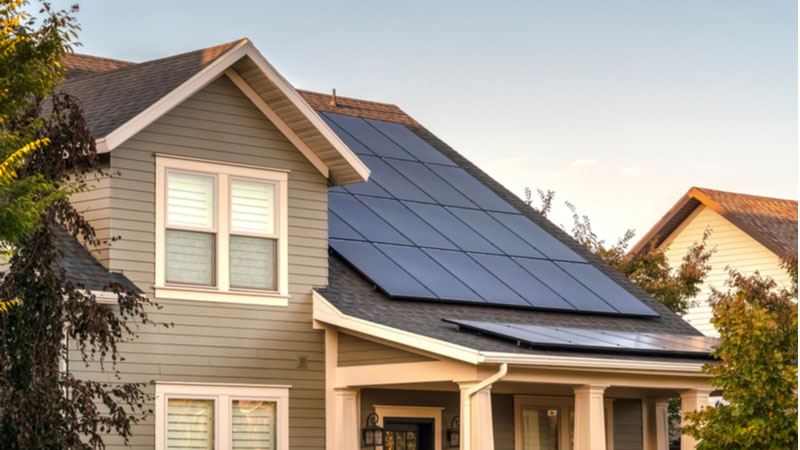Blog
Do Solar Panels Attract Lightning: How Solar Panels Work in Stormy Weather

Yakima is known for its abundant sunshine, making solar power an attractive option for many homeowners. But as we experience our share of thunderstorms and winter weather, a common question arises: Do solar panels attract lightning?
We’ll address this concern head-on and explain how solar panels are built to operate safely and efficiently, even when Yakima’s weather turns stormy.
Understanding how your solar system interacts with the elements is key to peace of mind and maximizing your investment. In this post, you’ll learn the truth about lightning and solar panels, how they perform on cloudy or rainy days, and the essential safety measures that protect your home.
Debunking the Myth: Solar Panels and Lightning Strikes
The Short Answer: No, solar panels do not inherently attract lightning.
Why the Misconception Exists
- Solar panels are installed on rooftops, which are already elevated and naturally exposed
- They contain conductive materials like metal frames, wiring, and silicon cells
- Their visibility may lead homeowners to assume they’re vulnerable during a storm
The Reality of Lightning Strikes
Lightning doesn’t randomly target metal. It looks for the path of least resistance to the ground. Typically, it strikes the tallest object in an area, regardless of its material. If your home is the tallest structure on your property, it could be struck, but having solar panels doesn’t make that any more likely.
Other rooftop elements, such as chimneys or antennas, don’t increase lightning risk either. The presence of panels on your roof doesn’t change the fundamentals of how lightning behaves.
Built for Protection: Solar Panel Safety Features
A properly installed solar system is designed to handle electrical surges and protect your home’s infrastructure.
Proper Grounding is Key
This is the most important safety feature in any solar installation. Panels and racking systems are grounded in accordance with national and local electrical codes.
How it works: Grounding creates a direct and safe path for stray electrical currents, including those from lightning strikes or nearby surges, to travel into the earth. This protects both the system and your home.
Why it matters: Without grounding, energy from a lightning strike could damage the system, overheat components, or create fire risks inside the home.
Surge Protection Devices (SPDs)
In addition to grounding, most modern systems include SPDs that detect sudden voltage spikes and redirect that energy away from vulnerable components like inverters.
These devices help guard against damage from indirect lightning strikes or grid fluctuations, providing another layer of defense.
Robust Construction
Solar panels are engineered to handle exposure to wind, hail, and temperature swings. They’re made with tempered glass and reinforced frames designed for years of reliable use, even in harsh weather.
Solar Performance in Yakima’s Stormy Weather
Yakima’s climate includes a mix of sun, snow, and the occasional thunderstorm. Fortunately, solar systems are built to adapt to these conditions with minimal disruption.
Cloudy Days
Solar panels convert light into electricity. They don’t need direct sunlight to work.
Performance: On overcast days, panels still absorb diffuse sunlight and can produce around 10 to 25 percent of their rated output.
Efficiency Tip: Homeowners with net metering or battery backup can use stored energy from sunnier days to cover the gap during cloudy periods.
Rainy Days
Rainy weather affects solar output similarly to cloud cover.
Performance: You can expect a temporary dip in energy generation, but production continues.
Bonus: Rain naturally washes away dust and debris, helping keep your panels clean and improving long-term efficiency.
Hail and Snow
Hail: Most panels are tested to withstand hailstones up to one inch in diameter at high speeds. While extremely large or severe hail can cause damage, this level of impact is rare.
Snow: Heavy snowfall can temporarily block sunlight and stop production. However, because panels are angled and have a smooth surface, snow tends to slide off as it melts or as the sun returns. Yakima’s lighter, dry snow is usually less of a concern compared to wetter climates.
The Importance of Professional Solar Installation in Yakima
Choosing a licensed and experienced solar installer isn’t just about energy savings. It’s also about safety and performance. Proper installation ensures your system complies with all applicable standards and functions the way it’s designed to.
Code Compliance
Campbell’s solar installations follow all national and local regulations, including NEC grounding requirements and mounting standards. Our team ensures every connection, junction, and panel is installed to code.
System Sizing and Design
We evaluate your home’s sun exposure, roof orientation, and seasonal shading to create a custom system that matches your energy goals. A well-designed system is more reliable, produces more power, and reduces strain on your equipment during extreme weather.
Warranty Protection
A poorly installed system could void manufacturer warranties. We follow best practices and provide clear documentation, helping ensure that your investment remains protected for years to come.
Safety First
Electrical safety is a top priority on every job. Our installers are trained in safe handling procedures and understand how to properly ground and shield your system against power surges and environmental exposure.
The Campbell Difference
At Campbell & Company, we bring over 40 years of home service experience to every project we take on. Our solar installation process includes:
- In-depth consultation
- Transparent pricing
- Tailored designs
- Expert installation
- Thorough inspection and testing
- Ongoing support
We’re proud to serve Yakima and the Tri-Cities with solar solutions built for performance, safety, and long-term value.
Ready to Go Solar With Confidence?
Solar panels don’t attract lightning. And with the right installation, your system can handle whatever Yakima weather throws its way. At Campbell & Company, we install high-efficiency solar systems that are built to last and backed by local expertise you can trust.
If you’re considering solar, we’ll help you understand your options and design a system that fits your home and budget. Whether it’s a clear sunny day or a passing storm, you’ll have reliable energy and the confidence that your system is safe.
Call today to schedule your free consultation and get started with a solar installation built for Yakima’s climate.

